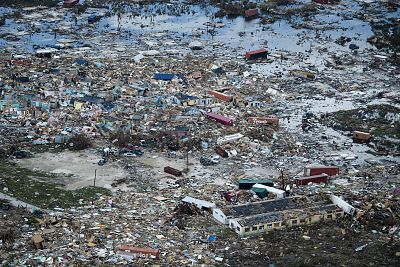Almost four months after Hurricane Dorian flattened and flooded Great Abaco Island, the devastation looks much as it did when the storm swept through.
GREAT ABACO, Bahamas — Months after Hurricane Dorian flattened and flooded Great Abaco Island, the devastation looks much as it did when thestorm swept through in September — the strongest ever to hit the Bahamas.
The official death toll stands at 70, but officials have said that more than 600 undocumented residents may have drowned and been washed out to sea. Dorian pummeled the islands with sustained winds of 185 mph, storm surges and torrential rain in a sustained two-day assault.
Months later, life remains a major struggle for those left behind as survivors grow increasingly frustrated with the slow speed of recovery.
"We feel forgotten," said June Russell, whose job as a fishing guide relied on tourism.
For more on this, watch "Nightly News" this Sunday at 6:30 p.m. E.T./5:30 p.m. CT
On a visit last month, every structure remains visibly damaged or destroyed. The police station in Great Abaco appears frozen in time, with a blue police boat leaning on the destroyed building, whose roof was partially collapsed. Elsewhere, a tractor hauled a crushed silver car, filled with debris, from the remains of a pink home.
"This island is our home, not just the physical structure that all of us live in," Russell said. "This land, this dirt, this road that we ride on, this is our home, this is in our blood."
Like many survivors, Russell's family has been separated by Dorian.
Her 19-year-old son now lives on the island of Nassau, while she and her 13-year-old daughter live on another Bahamian island in Spanish Wells. Russell travels back and forth to the Abaco Islands.
"Everyone was affected," she said. "Other people lost family members, they watched people slip away right out of their arms into the water. So, you have so many variable levels of trauma that have occurred with everyone."
"There is no home to go to," she said. "There is an island with destruction and crumbled buildings, but there's nowhere for these people to live."
Jack Thompson, the coordinator for the recovery and restoration efforts on behalf of the Bahamian government, said the island was currently undergoing "the mother of all cleanups."
"I understand what people are dealing with," he said. "And by the same token, I understand the efforts that are afoot to address it, and I also say that we have to do it in a methodical and in an orderly fashion."
"I think all hands are on deck, to ensure that Abaco returns to a state of normalcy as quickly as possible," he said.
While some have expressed frustration with the pace of the efforts, government officials have said it took the U.S. years to recover after Hurricane Andrew, a Category 5 storm, hit Florida in 1992 and Category 3 Hurricane Katrina hit New Orleans in 2005 (Dorian was a Category 5). They have said it takes a long time to get the necessary supplies to the Bahamas because it's an island. While the timeline for recovery is a moving target, some estimate it could probably take years.
At a supermarket that had to close after the hurricane, Aaron Curry said, "We were dying for this supermarket to open up again."
It's reopening signified hope, he said.
"It gives us a lot of hope, honestly," he said. "It makes me feel a lot better, like things are getting back to normal."
Russell said that while she was thankful she and her family survived, the ongoing uncertainty of the recovery remains.
"Every day you wake up and you thank God for life first and then you think: 'How did I get here? How did we all get here? How do we try and put it back?"
Kerry Sanders reported from Great Abaco, Bahamas, and Daniella Silva from New York.












